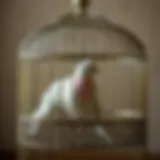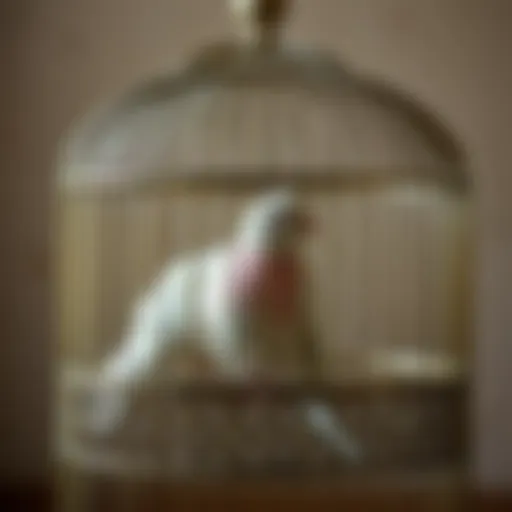Understanding the Financial Commitment of Macaws
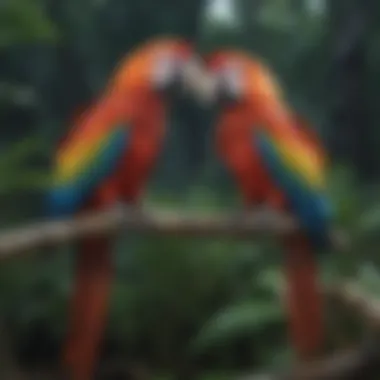

Intro
Macaws are captivating creatures, known for their striking colors and intelligence. Many people are drawn to them as exotic pets. However, acquiring a macaw is far more than just a one-time purchase; it involves a series of long-term commitments. This article goes deeper into understanding the costs associated with owning macaws. It highlights the crucial factors that can affect their prices while providing insights that prospective owners need to consider.
In this narrative, we will thoroughly examine initial purchase prices for different species of macaws, ongoing maintenance costs, and necessary legal considerations. By understanding these aspects, potential owners can make well-informed decisions before bringing a macaw into their homes.
Understanding Your Pet
Pet Behavior Basics
Macaws are intelligent and social animals. They thrive on social interaction, whether with humans or other birds. Their behavior includes loud vocalizations and curiosity about their environment. Understanding these traits is crucial for potential owners. A macaw left alone too often can experience stress and develop behavioral issues.
Common Breed Characteristics
There are several species of macaws, such as the Blue-and-yellow Macaw, Scarlet Macaw, and Green-winged Macaw, each with unique characteristics. Blue-and-yellow Macaws are known for their playful demeanor, while Scarlet Macaws tend to be more sensitive. Green-winged Macaws are often regarded as gentle giants.
Species-Specific Needs
Each species of macaw has unique needs. For instance, some may require larger cages or specific diets. Understanding these differences is vital when determining whether you can meet the needs of the specific species you are interested in.
Pet Care and Maintenance
Feeding Guidelines
Feeding your macaw a balanced diet is essential for its well-being. A typical diet should include high-quality pellets, fresh fruits, and vegetables. Nuts can also be given as treats but should be limited due to high-fat content.
Grooming Essentials
Regular grooming is vital for a macaw’s health. This includes nail clipping, feather checks, and beak maintenance. Regular grooming not only helps with their physical health but also increases comfort and decreases stress.
Hygiene Practices
Hygiene is critical in caring for macaws. Clean their cage daily, and provide fresh food and water. It's also important to routinely wash their toys and food dishes to prevent bacteria build-up.
Training and Development
Basic Commands and Skills
Training a macaw is an important aspect of ownership. Teaching basic commands, such as "step up" or "come here," can enhance the bond between owner and bird. Positive reinforcement techniques work best, allowing the macaw to learn while enjoying the process.
Behavioral Training Techniques
Addressing undesirable behaviors early makes for easier training. Techniques such as distraction and redirection can prevent bad habits from forming. Teaching boundaries is essential for a harmonious household.
Addressing Common Behavior Issues
Macaws may exhibit some common behaviors like screaming or biting. Understanding these actions as forms of communication helps owners address them effectively. Patience and consistency in training are key.
Health and Wellness
Routine Vet Check-ups
Regular visits to an avian veterinarian are crucial for maintaining your macaw's health. These check-ups can identify potential issues before they become severe, ensuring your pet remains healthy.
Vaccination Needs
Macaws require specific vaccinations based on their exposure to other birds. Consult with an avian vet to understand which vaccinations are necessary for your macaw's region and lifestyle.
Recognizing Signs of Illness
Owners must be vigilant about monitoring their macaw's health. Signs of illness may include changes in appetite, lethargy, or abnormal droppings. Early detection of health issues leads to better outcomes.
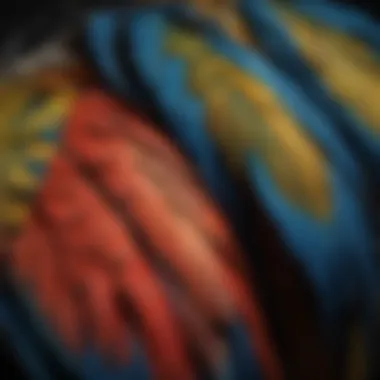

Enrichment and Activities
Indoor vs. Outdoor Activities
Both indoor and outdoor activities are important for a macaw's mental and physical stimulation. Indoor activities can involve interactive toys or training sessions, while safe outdoor time can provide new sights and sounds for exploration.
Interactive Toys and Games
Providing stimulating toys that encourage problem-solving is beneficial for macaws. Toys made from natural materials can help prevent boredom and encourage physical activity.
Socialization Opportunities
Socialization is important for macaws. Allowing them to meet other birds or participating in bird shows can enhance their adaptability and confidence. It fosters a more enriching life for your macaw, improving its behavior and happiness.
Intro to Macaws
Macaws are more than just colorful birds; they represent commitment, companionship, and responsibility. Known for their striking colors and intelligent behavior, these parrots have a profound appeal to many pet owners and animal lovers. Understanding the cost associated with macaw ownership involves more than just the price tag at a pet store. It encompasses a variety of factors including initial purchase costs, ongoing care expenses, and legal affairs.
For potential owners, it is essential to consider not just the beauty of these creatures but also their needs. Macaws are social animals that require attention, interaction, and a suitable environment to thrive. This understanding can help mitigate the risk of adopting a macaw only to find that the reality of ownership does not meet one's expectations.
Moreover, the costs can vary substantially based on species, geographical considerations, and individual circumstances. Each type of macaw comes with its own unique attributes and care requirements, which can all influence the investment needed.
Entering macaw ownership is not simply a decision of acquiring a pet; it is a long-term commitment likely lasting several decades. Hence, a comprehensive understanding of the costs involved can help prospective owners ensure they are fully prepared for the responsibilities ahead.
By delving into the various sections of this article, readers will gain valuable insights into the financial aspects of owning a macaw. This knowledge is crucial for making informed choices that align with both their lifestyle and their ability to care for these magnificent birds.
"Understanding macaws goes beyond mere fascination; it demands a thorough consideration of their needs and costs involved."
In summary, the journey into the world of macaws begins with a clear grasp of the financial obligations. It sets the foundation for responsible pet ownership and enhances the overall experience of creating a bond with these incredible birds.
Species of Macaws and Their Prices
Understanding the species of macaws and their prices is crucial for anyone considering adding one of these beautiful birds to their family. Each macaw species presents unique characteristics, appearances, and generally, a varied price range. Being informed about these factors enables prospective owners to make educated decisions regarding which type of macaw aligns best with their lifestyle and budget. This section breaks down some of the most popular species, offering valuable insights into their associated costs and why they might appeal to different kinds of owners.
Blue and Gold Macaw
The Blue and Gold Macaw, with its striking plumage of vibrant blue and yellow feathers, is one of the most recognized species. These birds are known for their intelligence and playful demeanor. Prices for Blue and Gold Macaws typically fall between $1,200 and $2,500. Factors like breeding lineage and age can affect the price.
These macaws usually make excellent companions for families, as they tend to be social and affectionate. However, potential owners should consider the time and interaction these birds require daily.
Scarlet Macaw
Scarlet Macaws are famous for their bright red feathers, coupled with blue and yellow accents. They are often found in tropical rainforests and can live up to 50 years in captivity. Price ranges for Scarlet Macaws generally fall between $1,500 and $3,000.
Owning a Scarlet Macaw requires dedication since they are highly social animals and thrive on interaction. They can develop strong bonds with their owners, making them a delightful addition to any home, but they also demand constant engagement to remain happy.
Green-winged Macaw
Green-winged Macaws mix beauty with an impression of gentleness. They have a broad wingspan and display green feathers decorated with red and blue. Their prices usually range from $1,500 to $3,500.
They are known for their more calm and quieter nature compared to other macaws, which can be an appealing factor for some families. However, potential owners should still prepare for the care and attention they will need.
Hyacinth Macaw
The Hyacinth Macaw is the largest flying parrot species, and its deep blue feathers give it a unique elegance. Due to its rarity, it commands a high price, often ranging from $8,000 to $15,000. Hyacinths are known for their strong personalities and intelligence, but they also require a confident owner who can manage their strong will.
It is important for potential owners to ensure that they have adequate resources and space, as these birds thrive in a stimulating environment.
Other Less Common Species
There are several other macaw species that are less common but still worth considering. The Military Macaw, for example, typically costs between $1,500 to $2,500, while the Noble Macaw can be found for about $1,800 to $2,800.
While these species might not be as popular as their counterparts, they can offer wonderful companionship and unique traits. Understanding the characteristics and price ranges of these less common macaws broadens the choices for potential owners.
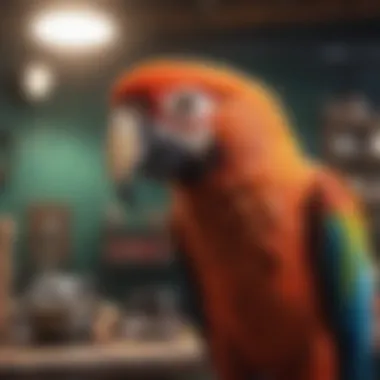

In summary, knowing the specifications and pricing of different macaw species is essential for making informed purchasing decisions. This knowledge also lays the foundation for understand the ongoing costs and commitments associated with macaw ownership.
Factors Influencing Macaw Prices
In understanding the overall financial commitment to owning a macaw, one must look closely at the factors influencing their prices. Each macaw's cost can fluctuate widely based on various aspects that potential owners should consider. Knowing these factors helps buyers make informed decisions, ensuring they enter a long-term relationship knowing all associated expenses. This section will explore several key elements that directly impact the price of macaws.
Breeder Reputation
The reputation of the breeder plays a significant role in determining the price of macaws. A reputable breeder often charges more for their birds due to their consistent quality and care in breeding practices. They tend to follow ethical breeding standards, ensure proper health checks, and provide substantial socialization for the birds. Customers often feel more secure buying from established breeders, as they are likely to offer warranties, proper documentation, and backup support. Different breeders will have different costs, but prioritizing a reliable source can justify a higher price.
Age and Training of Bird
The age and training of a macaw can greatly affect its market value. Younger birds, typically between 6 to 12 months old, attract higher prices as they are seen as more adaptable to new environments. Training also plays a crucial role; macaws that come with foundational training or specific behavioral cues can command a premium. Well-trained birds usually integrate better into family settings and are more sociable. In this way, prospective owners must weigh the importance of age versus cost and the time they have available for initial training.
Genetics and Color Variations
Genetics affect the physical appearance and behavior of macaws, impacting their price. Color variations can lead to price differences as rare color genes often result in higher demand. For instance, Hyacinth Macaws, known for their stunning royal blue feathers, can be significantly more expensive than Green-winged Macaws due to their limited availability in the pet trade. Owners interested in particular breeds or colors should be aware that unique genetics may come with a higher price tag.
Availability and Demand
Market availability greatly influences the price of macaws. In seasons or regions where demand for specific breeds rises, so does the price. Economic factors, trends in pet ownership, and changes in community interest drive demand; thus, understanding local market dynamics is essential for potential buyers. High-demand species might see inflated prices, while less popular breeds could be more budget-friendly. This aspect also ties into the timing of a purchase.
Geographic Location
Finally, geographic location can substantially influence the price of macaws. Certain areas have a higher cost of living or a greater demand for exotic pets, resulting in higher prices. Additionally, laws and regulations surrounding macaw ownership might vary, thereby affecting availability and legal considerations. In urban areas with limited space and available breeders, one might see inflated prices compared to rural locations where accessibility is greater. Therefore, researching local markets can yield insights into potential expenses when considering macaws.
Initial Costs of Acquiring a Macaw
Understanding the initial costs of acquiring a macaw is crucial for anyone considering bringing one of these intelligent birds into their home. This section highlights several critical elements associated with upfront expenses and the considerations that prospective owners must take into account. Unlike conventional pets, macaws require a significant financial commitment right from the start.
Purchase Price Range
The purchase price of a macaw varies widely depending on the species, breeder reputation, and the individual bird's characteristics. Generally, prices can range significantly:
- Blue and Gold Macaw: These are popular and can cost between $1,000 to $2,500.
- Scarlet Macaw: Their prices typically range from $1,500 to $3,500.
- Green-winged Macaw: Expect to pay anywhere from $1,500 to $2,500.
- Hyacinth Macaw: Known as the most expensive, these can go for $8,000 to $15,000.
- Other Less Common Species: Prices can be lower, starting around $800 for species such as the Military Macaw.
These prices are not mere numbers; they reflect the value of the bird and the care involved. Choosing where to buy is vital as reputable breeders ensure healthier birds, which can save future costs.
Legal Considerations and Permit Fees
Owning a macaw involves understanding various legal requirements. Some regions may require permits to possess macaws due to their status as exotic birds. The permit fees can vary based on jurisdiction and can range from $50 to several hundred dollars. In some areas, failure to acquire the necessary permits can result in hefty fines or loss of the bird. Always check with local wildlife authority to ensure compliance with laws governing macaw ownership. This research protects both the owner and the bird.
Transportation and Quarantine Expenses
When acquiring a macaw, consider the logistics of transportation. Birds often need to be transported safely, sometimes requiring special carriers designed to prevent stress and potential injury. Moreover, if acquiring a bird from a different state or country, you may need to factor in quarantine expenses, which can include veterinary checks and temporary housing arrangements. This can add another few hundred dollars to initial costs.
"Prospective macaw owners should thoroughly evaluate both purchase and transport costs before acquiring a bird to prevent unexpected financial burdens later on."
By understanding these initial costs, potential macaw owners can better prepare for the financial responsibilities involved in their care. This preparation is essential for making informed decisions and ensuring a harmonious relationship with these extraordinary creatures.
Ongoing Expenses of Macaw Ownership
Owning a macaw goes beyond the initial purchase price. Ongoing expenses are a crucial aspect of macaw ownership that demand careful consideration. These birds require constant care, making it vital to understand the financial commitment involved. Being aware of these ongoing costs allows prospective owners to budget effectively and ensures the well-being of their avian companions.
Feeding and Nutrition Costs
Macaws have unique dietary needs, requiring more than just typical pet food. Their diet includes a variety of seeds, nuts, fruits, and vegetables. High-quality pellets are often recommended as a staple. The nutritional needs can vary based on the species and individual health conditions.
The average monthly expense for feeding a macaw can range from $40 to $150, depending on dietary requirements and the quality of food. Providing fresh produce regularly not only promotes their health but also adds to the costs. Investing in proper nutrition is essential, as it affects their overall health, vibrancy, and lifespan.
Healthcare and Veterinary Services
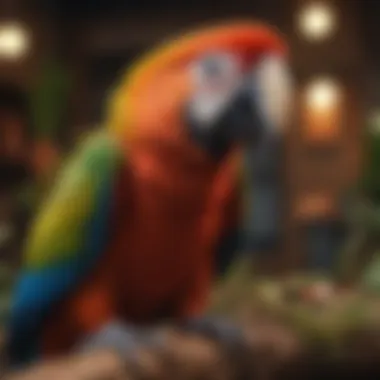

Routine veterinary care is crucial for macaws. Regular check-ups help detect any potential health issues early on. Vaccinations and preventive care can lead to significant costs. Vet visits can vary widely in price, ranging from $50 to $150 per visit. In case of emergencies, costs can escalate quickly.
Annual health care expenses can easily accumulate to several hundred dollars. It is also wise to consider potential long-term health issues that may arise, as they can require ongoing treatments or specialized care. Therefore, budgeting for veterinary services is necessary for responsible ownership.
Housing and Equipment Costs
Macaws need an appropriate living environment. Large, spacious cages ensure they can move freely and comfortably. The initial purchase of a proper cage can range from $500 to $2,000, depending on the size and features. Additional costs come from toys and perches, which not only stimulate mental health but also promote physical activity. Regular replacement of these items is needed, adding to ongoing costs.
Others may require related equipment like playstands or travel carriers. Overall, projecting costs for housing and equipment can average between $200 to $500 annually, depending on how often they are replaced or upgraded.
Insurance Considerations
Insurance for pet macaws can be a topic that many owners overlook. However, having pet insurance can help alleviate some costs related to unexpected health issues or accidents. Policies vary widely in coverage and cost, with average premiums around $20 to $50 per month. Some policies do not cover pre-existing conditions, so it is important to read the fine print.
An unexpected injury or illness could result in significant financial strain. Therefore, considering pet insurance as part of the overall budgeting for your macaw's care can provide peace of mind amid the unpredictable nature of life with pets.
Owning a macaw requires both enthusiasm and financial readiness. Understanding the ongoing costs ensures a harmonious relationship between the owner and the pet.
In summary, prospective macaw owners must prepare for various ongoing costs associated with feeding, healthcare, housing, and insurance. Each of these elements plays a vital role in providing a safe and healthy environment for these magnificent birds.
Legal and Ethical Responsibilities
When considering macaw ownership, understanding legal and ethical responsibilities is paramount. This aspect cannot be overlooked since it encompasses not only the rules governing ownership but also the moral duties that come with caring for these intelligent birds. Ignoring these responsibilities can lead to legal issues or contribute to the suffering of these sensitive creatures.
Understanding the Laws Governing Macaw Ownership
Different jurisdictions have varied laws concerning the ownership of exotic birds, including macaws. It is crucial for prospective owners to research and comprehend these laws, as they may include requirements for permits and licenses. Failure to adhere to local regulations can result in penalties or confiscation of the bird.
In many areas, the legal requirements stem from conservation efforts designed to protect endangered species. For example, the Hyacinth Macaw is listed as vulnerable under certain international agreements. Therefore, any trade involving this species must comply with strict regulations. It is wise to check resources like en.wikipedia.org or local wildlife authorities for updated information on laws related to exotic birds.
Additionally, potential owners should be aware of any restrictions on breeding and selling macaws. These laws ensure responsible breeding practices and help prevent unethical behaviors such as illegal poaching. Educating oneself on these laws reflects a commitment to responsible pet ownership.
Ethical Sourcing and Adoption Considerations
Ethical sourcing of macaws is a significant concern for potential owners. It involves making choices that support the well-being of these birds and promote sustainable practices. The idea is to obtain macaws from reputable sources that prioritize the health and welfare of the animals.
Many people consider adopting macaws from shelters or rescues. This not only provides a home for a bird in need but also alleviates the burden on overcrowded facilities. Adopting can be a humane alternative to purchasing a bird from a breeder, especially when one considers the reality of birds facing abandonment or neglect.
If choosing to buy from a breeder, look for those who implement ethical practices. These breeders should prioritize the health of their birds, provide proper living conditions, and encourage education about macaw care. A responsible breeder will gladly offer health clearances and will allow potential buyers to visit their facilities.
In summary, when owning a macaw, both legal and ethical considerations are vital. Being an informed owner entails understanding the laws of your locale and choosing ethically sourced birds. These steps are crucial for promoting a responsible ownership that ultimately contributes to the well-being of these remarkable creatures.
Market Trends in Macaw Prices
Understanding market trends in macaw prices is crucial for prospective owners. The financial landscape surrounding these birds can shift due to various factors. By analyzing price fluctuations and current market dynamics, potential owners can make informed financial decisions. This section aims to clarify these aspects, enabling readers to anticipate costs and invest wisely.
Historical Price Fluctuations
Price fluctuations for macaws have been notable over the years. Often influenced by supply and demand, these historical trends can inform potential owners about expected costs. For instance, in the past, certain species saw a surge in popularity, leading to increased prices. The Hyacinth Macaw has been a prime example, with prices rising significantly due to its striking appearance and rarity.
Factors such as economic conditions and breeding practices have impacted these fluctuations. During economic downturns, demand may drop, causing prices to stabilize or even decrease. Conversely, periods of increased interest in pet ownership can lead to higher prices. Understanding these historical patterns provides valuable insights into what to expect in today’s market.
Current Market Dynamics
Currently, the market for macaws is influenced by both local and global factors. Recent increases in import regulations and breeding restrictions have affected availability. As a result, prices have shown a tendency to rise, particularly for species that are harder to acquire. For instance, the Scarlet Macaw has become more expensive due to tightening laws on wild capture and trade.
Also, buyer preferences play a role in current pricing structures. With growing awareness regarding macaw care and the commitment required, some previously popular species might see a decrease in demand, affecting their prices. Additionally, social media platforms, like Reddit and Facebook, have empowered owners to share their experiences, further shaping market perception and trends.
Ultimately, staying informed about these market dynamics is essential for future macaw owners. Knowledge of price history and current conditions will aid in budgeting and making sound ownership decisions.
By knowing the market trends, prospective owners can approach macaw ownership with clarity and confidence.
Culmination
The importance of evaluating both initial and ongoing expenses cannot be understated. This not only ensures that potential owners are financially capable of providing a suitable environment for their birds but also fosters a healthy and happy pet ownership experience. Knowledge of market trends can aid potential buyers in making informed decisions regarding their choices.
Considerations such as insurance and healthcare, legal permits, and ethical sourcing reinforce the notion that macaw ownership is a long-term commitment. The journey of having a macaw is significant, and it requires thoughtful planning and dedication to their care.
"Investing in a macaw is not just about the money; it’s about creating a bond that enriches your life and theirs."


